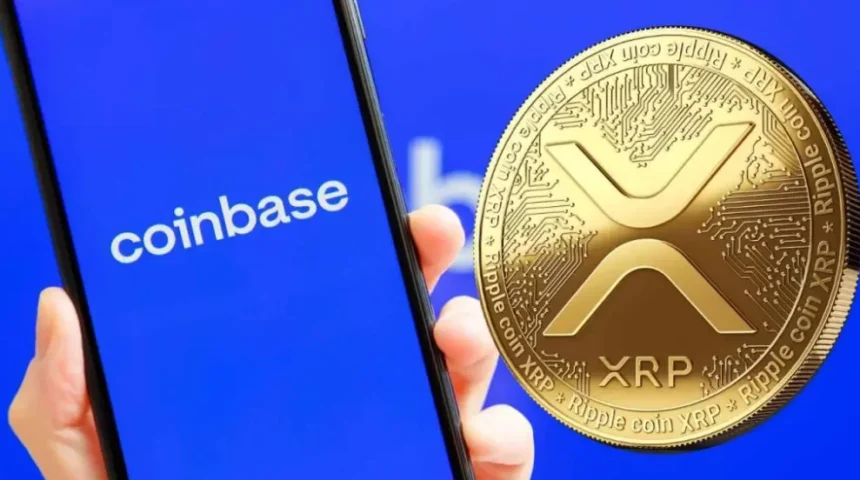Coinbase Derivatives, a subsidiary of Coinbase Institutional, has filed with the Commodity Futures Trading Commission (CFTC) to introduce futures contracts tied to XRP, the third-largest cryptocurrency by market cap.
This development underscores Coinbase’s ambition to bridge traditional finance (TradFi) and the cryptocurrency ecosystem, leveraging the growing institutional interest in XRP after years of regulatory uncertainty.
Coinbase Derivatives XRP futures
The filing, announced on Thursday by Coinbase Institutional, is a strategic move by Coinbase to expand its offerings in the regulated derivatives space.
If approved, the XRP futures will go live on April 21, 2025, providing a capital-efficient and regulated avenue for market participants. Moreover, the potential development would position XRP as a key asset for institutional traders seeking exposure to one of the most liquid digital currencies
The proposed XRP futures contracts will be the second CFTC-regulated offering in the United States, following the launch of similar contracts by Chicago-based Bitnomial in March 2025.
The leading exchange anticipates that the contracts will enhance market depth and attract institutional players, allowing traders to speculate on or hedge against XRP’s price movements without directly holding the asset.
Each futures contract will represent 10,000 XRP, equivalent to approximately $20,000 at current market prices, where XRP is trading above $2 with minimal fluctuation over the past 24 hours.
The contracts will be available for the current month and the subsequent two months, with a built-in safeguard that halts trading if XRP’s spot price experiences a volatility swing exceeding 10% within an hour. This mechanism aims to ensure stability and protect traders in a market known for its rapid price shifts.
Read also: Why You Should Hold 1,000 to 10,000 XRP
Ripple-SEC case resolution renews investor interest
The filing comes amid the resolution in Ripple Labs’ long-standing legal battle with the U.S. Securities and Exchange Commission (SEC). Initiated in December 2020, the SEC accused Ripple of conducting unregistered securities sales worth $1.3 billion through XRP.
A ruling in July 2023 by Judge Analisa Torres clarified that XRP is not a security for retail sales, though institutional sales met the criteria under the Howey Test. The SEC’s subsequent decision to drop its appeal in early 2025 provided Ripple with much-needed regulatory clarity, which boosts confidence among investors and market participants.
This clarity has catalyzed renewed interest in XRP, with the crypto asset recording over $1.8 million inflows despite market-wide outflows and its price surging approximately 12% to $2.53 in late March 2025.
Amid this growing demand for XRP, Virtune XRP exchange-traded fund (ETF) saw its assets under management (AUM) surpass $110 million last month while the XRP Ledger automated market maker (AMM) liquidity reached a record high.
With a market capitalization exceeding $148 billion at the time of writing, XRP ranks as the third-largest cryptocurrency by value, trailing only bitcoin and Ether. XRP is known for its utility in facilitating fast, low-cost, cross-border payments. Its growing acceptance in regulated markets signals a maturation of its role in the financial ecosystem.
Read also: SEC Acknowledges Grayscale’s Spot XRP and Dogecoin ETF Filings, Approval Odds at 65%-70%
Coinbase doubles down on crypto derivatives
Coinbase’s move adds to the trend of U.S. exchanges doubling down on crypto derivatives. The firm recently launched futures contracts for Solana (SOL) and Hedera (HBAR), and it is awaiting CFTC approval for Cardano (ADA) and Natural Gas (NGS) futures planned for later this month.
In March 2025, Coinbase also introduced 24/7 BTC and ETH futures, addressing inefficiencies in the domestic derivatives market where trading hours were previously limited. T
he XRP futures filing builds on this momentum, reinforcing Coinbase’s strategy to offer a diverse range of regulated trading products to institutional and retail clients.
Coinbase’s adventure into XRP futures positions it in direct competition with Bitnomial, which pioneered CFTC-regulated XRP futures in March. Bitnomial’s launch followed its regulatory skirmish with the SEC, which it resolved by dropping a lawsuit after the agency backed off its classification of XRP as a security.
The Chicago-based exchange’s physically settled contracts have already gained traction, contributing to XRP’s price rally and setting the stage for Coinbase to enter the fray.
However, not all market signals are uniformly bullish. Funding rates for XRP perpetual contracts remain negative, indicating that some traders are betting against short-term price increases.
Additionally, XRP’s open interest (the total number of outstanding futures contracts) dropped to a 2025 low of 1.33 billion XRP in February, reflecting a period of bearish sentiment amid broader market corrections.
Despite these challenges, the combination of regulatory clarity and institutional adoption appears to be reversing this trend, with Coinbase’s filing seen as a vote of confidence in XRP’s long-term potential.
As the crypto industry navigates a shifting regulatory environment under the Donald Trump administration, which has vowed to make the U.S. “the crypto capital of the planet”, initiatives like Coinbase’s XRP futures signal a maturing market ready to meet the needs of sophisticated investors. Recall that Trump named XRP as part of the U.S. strategic crypto reserve.






